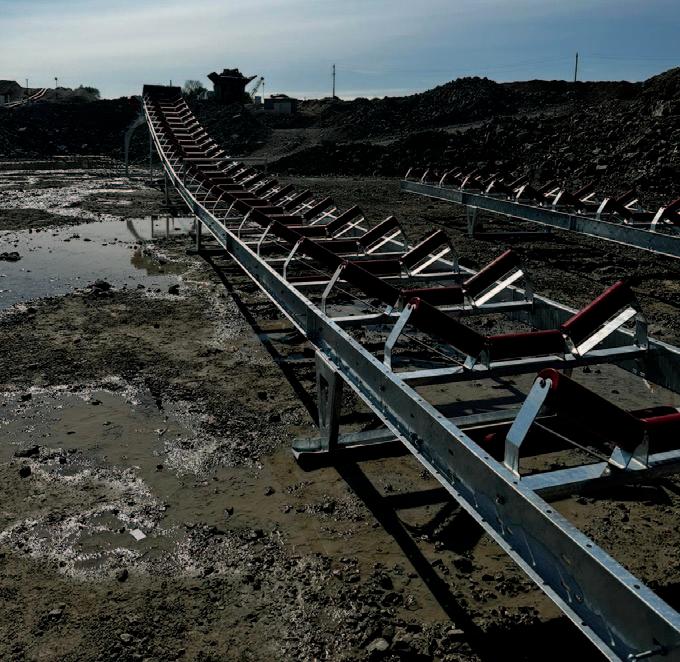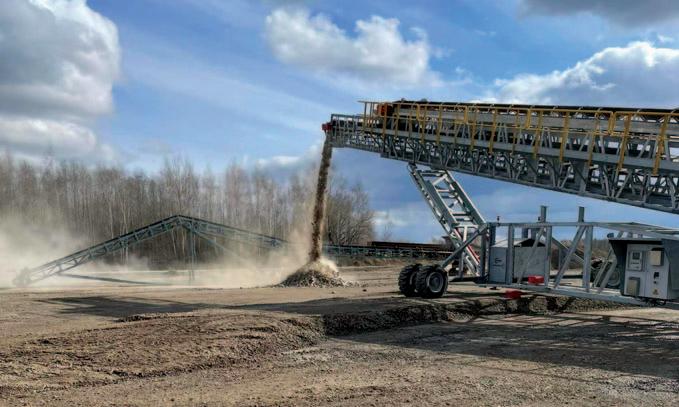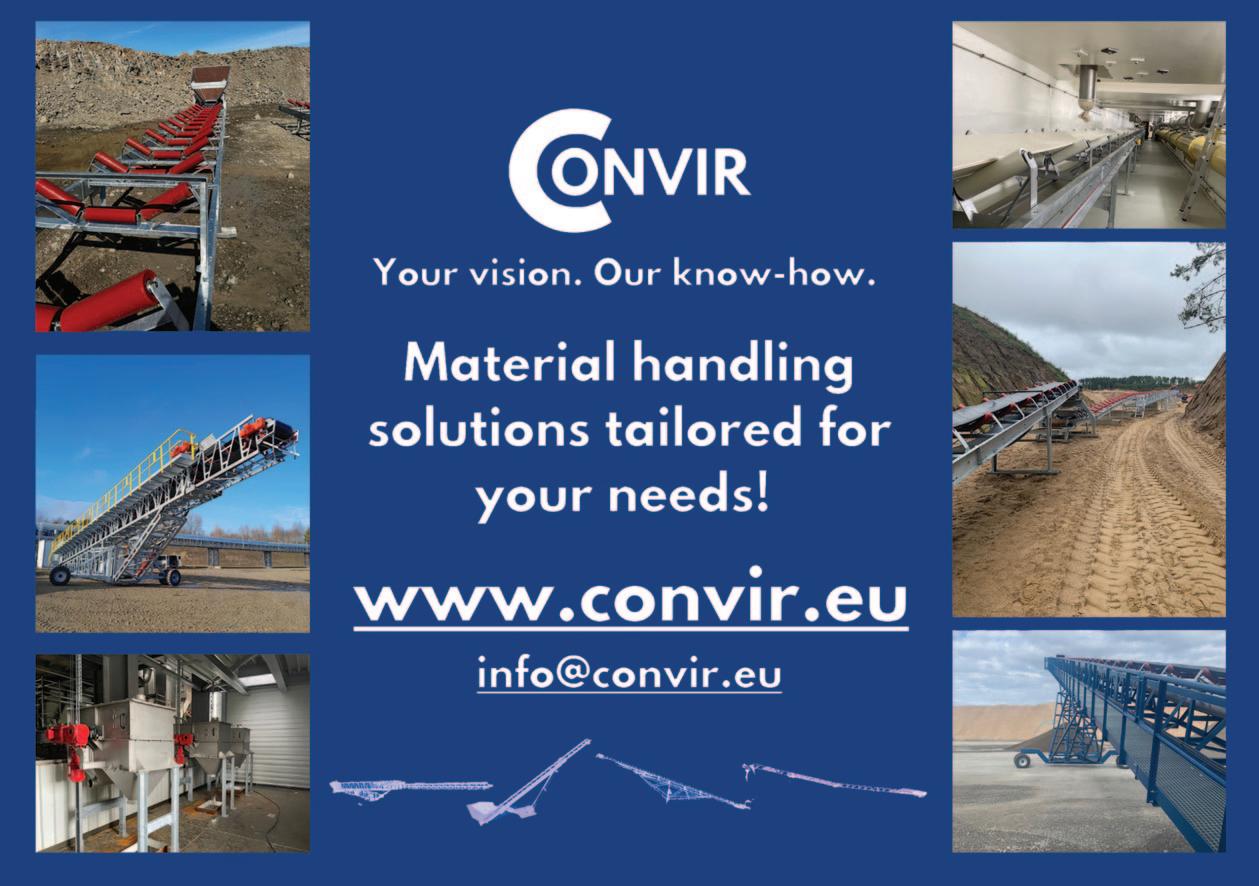
3 minute read
Conveyor systems in various fields: achieving best results
Conveyor systems are widely used across various industries to automate material handling processes and achieve optimal efficiency and productivity. The team at CONVIR believes that every company, industry and project require custom solutions, by creating unique conveyor systems to maximize efficiency of the manufacturer. In all industries, the use of conveyor systems can result in several benefits, including increased throughput, reduced labour costs, improved product quality, enhanced safety, and better inventory management. To achieve the best results, it's crucial to design and implement conveyor systems that are tailored to the specific needs and constraints of each industry and facility.
At JSC “CONVIR” the company tries to always keep up with the latest technologies and create conveyors as efficient as it can get in a certain situation. As of today it specializes in three main categories of belt conveyors.
1. MOBILE CONVEYORS
Mobile conveyors are a type of conveyor system designed to be easily transportable and versatile, making them ideal for various industries and applications. These conveyors are mounted on wheels or tracks, allowing them to be moved to different locations within a facility or even between job sites.
KEY FEATURES OF MOBILE CONVEYORS:
Mobility: mobile stackers and conveyors are designed to be easily moved within a facility or between job sites. They often have wheels or tracks that allow them to be transported and positioned quickly.
Adjustable heights: these systems typically have adjustable heights for both the input and output ends, allowing operators to adapt to different material handling scenarios and loading/unloading requirements.
Variable speeds: mobile stackers and conveyors have adjustable speed controls, allowing operators to control the rate at which materials are moved, stacked, or conveyed.
Telescoping boom: many mobile stackers feature telescoping booms or conveyors that can extend and retract, reaching different lengths to accommodate various stacking or conveying needs.
Compact design: these systems are designed with a compact footprint to maximize space efficiency when not in use or during transport.
Self-propelled: conveyors can be self-propelled, meaning they have their own power source (e.g., diesel engine or electric motor) for mobility. This eliminates the need for external towing or pushing.
Remote control: some models come with remote control options, allowing operators to adjust height, speed, and other parameters from a distance for added convenience and safety.
Durability: they are built to withstand rugged environments, making them suitable for industries such as mining, construction, and agriculture, where equipment may be exposed to harsh conditions.
Customizable: mobile stackers and conveyors can often be customized to meet specific application requirements, including belt type, width, and length, as well as loading and unloading options.
Environmental compliance: some models are designed with features to minimize environmental impact, such as dust suppression systems, which help control dust emissions.
JSC “CONVIR” is currently providing mobile conveyor solutions for mining, quarry, wood, sugar industries and ports.

2. STATIONARY CONVEYORS
Stationary conveyors provide a versatile and cost-effective solution for material handling and transportation needs within industrial facilities. Their flexibility, ease of installation, and adaptability make them valuable assets in optimizing production processes and enhancing overall operational efficiency. One of CONVIR’s flagship products is modular stationary conveyors. The hallmark feature of modular stationary conveyors is their modularity. These systems are constructed from individual modules. This modularity allows for easy customization and reconfiguration to meet changing needs. Modular conveyors are designed for easy installation and assembly. They often feature bolted connections, which simplify setup and reduce downtime during installation. Also the modular design enables scalability. Users can easily extend or modify the conveyor system by adding or removing modules to accommodate changes in production volume or layout as they can also be configured in various shapes, including straight lines, curves, or complex layouts, depending on the specific material flow requirements of the facility. These conveyors can accommodate different types of conveyor belts to suit the characteristics of the materials being transported. Modular conveyors can be equipped with a wide range of accessories, including diverters, chutes, sensors, and guides, to enhance their functionality and adapt them to specific applications.
The main clients of CONVIR in this area of specialization are sugar factories, quarries, mines and others. Naturally, this wide range of industries requires a high level of customization, starting from the belt type and ending with unique shapes of the transporter.

3. NON-STANDARD CONVEYORS & PRODUCTION
In order to discover solutions to previously undiscussed/covered problems,
CONVIR’s team is also always ready to collaborate with its clients in order to find unique solution. This could include for example the safety metal constructions and bridges or port loaders/unloaders that require the most attention to detail.
The best part of working with conveyors is that no two projects are the same, so JSC “CONVIR” works closely with its clients to successfully implement any of the three solutions in any kind of application or to create a conveyor system that intercepts mobile and stationary conveyors with new non-standard solutions.


